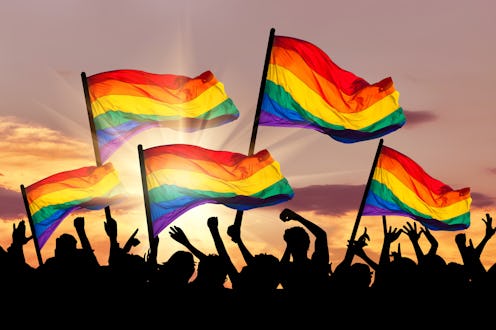
The filtering mechanism behind a new "family-friendly" search engine for children is ignoring one very significant population of children — LGBTQ+ ones and their allies. Powered by (though not owned by or affiliated with) Google, search engine Kiddle initially blocked searches of LGBTQ+ terms like "bisexual," "transgender," "queer," and "gay marriage" with a troubling message.
If you tried to type any of those words into the search bar, the site registered them as "bad words" that would be caught by its "guard robot." This message would pop up in lieu of search results:
"You have entered an LGBT related search query. Please realize that while Kiddle has nothing against the LGBT community, it's hard to guarantee the safety of all the search results for such queries. We recommend that you talk to your parent or guardian about such topics."
This response perpetuates the notion that any queer topic is somehow inherently inappropriate and/or that it will be littered with porn results. Newsflash: actual queer porn does not proliferate that easily! I wish it did! But I digress. The truth is, it's just a lazy algorithm. Case in point, according to The Independent:
"The site also still allows people to see adult content when searching for words like Pamela Anderson, and does not filter a story about a Danish radio host killing a rabbit."
Queer folks are not the big, bad sex fiends Kiddle makes them out to be. Plus, the internet is a thoroughly life-saving resource for many queer kids who may not have other, reliable resources and outlets to explore their own sexuality or gender identity. As Daily Dot points out, a 2013 report about online behaviors put out by the Gay, Lesbian, and Straight Education Network (GLSEN) found that 81 percent of LGBTQ+ youth use the internet to find health and medical information online, as opposed to only 46 percent of straight youth. They're also five times as likely to use the internet to search for information about sexuality as straight youth.
All of this is with good reason: sex education doesn't really cover the nuance of sexuality or gender identity (or even the nuance of desire, pleasure, or consent, tbh). Queer kids are literally starving for information about their desires, impulses, and identity, and school, straight parents, and a heteronormative and cisnormative society aren't really providing them with any answers. The internet is a vital place for them to feel visible. They can cull together the experiences of other queer folks to learn that they are not alone, just because they are very different from anyone in their school, community, or family. They can use reliable queer health resources to find the answers to questions that conventional sex ed doesn't answer (or, alternatively, to learn that the answers to their questions don't exist, because we have a long way to go when it comes to improving queer healthcare).
For their part, Kiddle has taken the outrage to heart: they unblocked a number of their LGBTQ+ search terms and curated kid-friendly resources to pop up in the search results after users began to notice the filter. Here's hoping they continue to expand and fine-tune their queer search queries.
For more LGBTQ stories, check out Bustle on YouTube: